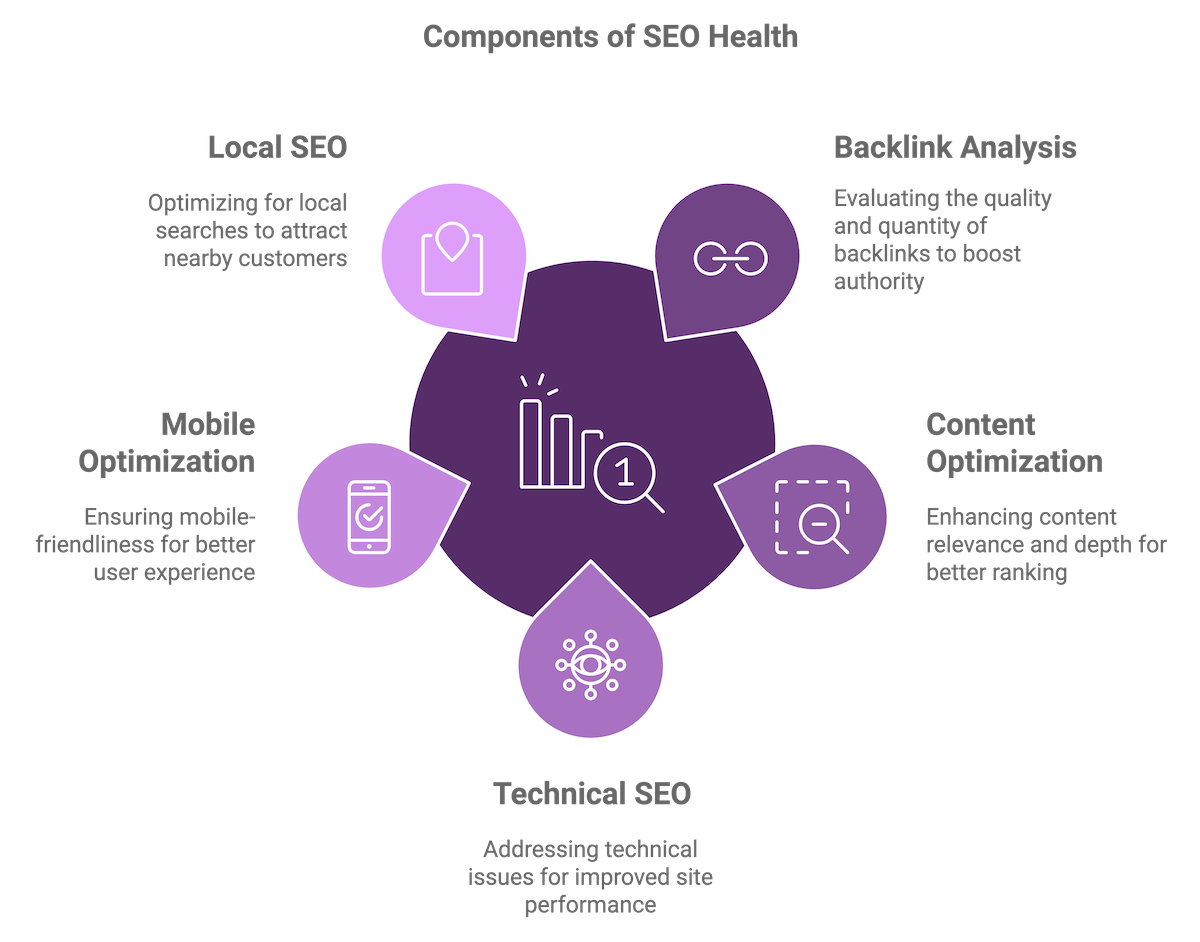Uncovering SEO Health: What Your Website Needs to Rank on Google
By: Hayden Jarman

Why isn’t my website ranking higher?
If you’re a business owner, you’ve likely asked this more than once.
An SEO health check goes beyond a simple audit; it identifies technical, on-page, and off-page issues that might be holding your site back. Understanding SEO health reveals insights that can drive top rankings, boost traffic, and ultimately impact your bottom line.
Let’s unpack the essentials of an SEO health check and how it can lead to real results.
Table of Contents:
- Why SEO Health Checks Matter
- Backlink Analysis: The Foundation of SEO Health
- Content Optimization: Quality and Length Matter
- Technical SEO and Core Web Vitals
- Mobile Optimization
- Local SEO: Reaching Local Customers
- Comprehensive SEO Health Check Summary
- Final Thoughts
🔍 SEO Technical Health Quiz 📈
Evaluate your site's technical SEO and receive personalized recommendations to improve rankings!
Why SEO Health Checks Matter
SEO isn’t static. Search engines, especially Google, constantly update their algorithms, refining what qualifies as "search-engine friendly."
Websites optimized even a year ago might be outdated by today’s standards.
Regular SEO health checks help ensure that sites stay compliant, competitive, and ready to draw organic traffic.
Key Insights About SEO Health
- 95% of web pages have no backlinks, representing missed opportunities for visibility.
- 1,447 words is the average content length for pages ranking on Google’s first page, showing that in-depth content performs best.
- Only 33% of websites meet Google’s Core Web Vitals standards, indicating the importance of technical SEO.
Regular health checks keep your site aligned with these metrics, enhancing its chances to rank higher and attract relevant traffic.
Backlink Analysis: The Foundation of SEO Health
Backlinks remain one of Google’s strongest ranking factors.
Experts like Neil Patel, Rand Fishkin, and Brian Dean emphasize the importance of backlinks in building authority and credibility. Websites with robust backlink profiles tend to rank better since Google interprets these links as signs of trust.
Why Are Backlinks Important?
- Boosts Domain Authority: High-quality backlinks increase your site’s domain authority, signaling credibility.
- Drives Referral Traffic: Links from trusted sites bring in new visitors.
- Aids in Indexing: More links help Google’s crawlers discover and index your pages faster.
Tools like Moz, Ahrefs, and SEMrush offer deep insights into backlinks, anchor text, and domain authority.
Use these tools to identify opportunities to strengthen your link profile and enhance your site’s search engine standing.
Effective Backlink Strategies
| Strategy | Description |
|---|---|
| Guest Blogging | Publish articles on other sites to earn valuable backlinks. |
| Broken Link Building | Identify broken links on other sites and suggest your content as a replacement. |
| Content Syndication | Share your content on larger sites to boost exposure and links. |
For a deeper dive, see our guide on SEO-Friendly Website Development.
Content Optimization: Quality and Length Matter
Content remains king, but only if it’s high-quality and relevant.
On average, pages ranking on Google’s first page contain 1,447 words. This reflects Google’s preference for in-depth, well-organized content that answers users’ questions comprehensively.
Quick Tips for Content Optimization
- Use Target Keywords: Place keywords in titles, headers, the first paragraph, and closing sentence.
- Incorporate LSI Terms: Add related terms like “SEO audit” and “website performance” to boost relevance.
- Break Down Complex Information: Use lists, tables, and bullet points to improve readability.
To learn more about optimizing for local SEO, check out our post on Local SEO Strategy for Small Businesses.
Technical SEO and Core Web Vitals
Technical SEO ensures your website is easy to crawl, fast, and user-friendly.
Google’s Core Web Vitals—metrics that focus on load time, interactivity, and visual stability—are critical for site performance.
With only 33% of websites meeting these standards, a technical SEO health check is essential.
Common Technical SEO Issues
- Page Load Speed: Slow-loading pages lead to higher bounce rates. Use Google Analytics and PageSpeed Insights to monitor and improve your site speed.
- Mobile Optimization: With 54.67% of global web traffic coming from mobile, responsive design is crucial.
- HTTPS & SSL: Google prioritizes secure sites. Make sure your URLs are HTTPS with SSL certificates.
For tips on boosting your site’s technical performance, read our article on Core Web Vitals 2024.
| Technical SEO Factor | Description | Recommended Tool |
|---|---|---|
| Site Speed | Speeds up page load time | Google PageSpeed Insights |
| Mobile Optimization | Adjusts site for mobile devices | Google Mobile-Friendly Test |
| Security (HTTPS) | Uses SSL for secure connections | Let’s Encrypt |
Mobile Optimization
Mobile optimization isn’t optional.
With mobile-first indexing, Google ranks your site based on its mobile version. Plus, 54.67% of web traffic comes from mobile devices. Sites that aren’t mobile-friendly risk losing visitors and rankings.
Key Elements of Mobile Optimization
- Responsive Design: Adapts layout to different screen sizes.
- Touch-Friendly Elements: Links and buttons should be easy to tap without zooming.
- Fast Loading Times: Mobile users expect quick access, so avoid heavy graphics.
Ensure your website meets these mobile standards by checking out our insights on Improving Lead Quality with SEO.
Local SEO: Reaching Local Customers
For businesses reliant on local customers, such as restaurants or law firms, local SEO is critical.
With 46% of Google searches showing local intent and 42% of local searches resulting in a click on Google’s Map Pack, optimizing for local SEO can make or break your business’s online visibility.
Steps to Improve Local SEO
- Optimize Google My Business: Make sure your profile includes accurate information about hours, location, and contact details.
- Encourage Customer Reviews: Positive reviews build credibility and improve local search rankings.
- Maintain Consistent Local Citations: Ensure consistent business listings on Yelp, TripAdvisor, and industry-specific directories.
To optimize your Google My Business profile, visit our detailed Google My Business Optimization Guide.

Comprehensive SEO Health Check Summary
| SEO Health Check Component | Purpose | Tools & Resources |
|---|---|---|
| Backlink Analysis | Assesses backlink quality and quantity | Ahrefs, Moz, SEMrush |
| Content Optimization | Ensures relevant keywords and depth | Surfer SEO, Clearscope |
| Technical SEO | Fixes issues with speed, security, and mobile compatibility | Google Search Console |
| Mobile Optimization | Improves user experience on mobile | Google Mobile-Friendly Test |
| Local SEO | Enhances visibility in local searches | Google My Business, Moz Local |
Final Thoughts
An SEO health check isn’t a one-time task—it’s an ongoing strategy.
Regular checks and improvements keep your site competitive, driving more traffic and enhancing the user experience.
SEO health checks cover every angle, from backlinks to local SEO, ensuring your website’s visibility and ranking power.
For strategies to take your SEO to the next level, check out more of our insights in posts like Building Topical Authority and SEO Strategy for 2024.
Related Posts:
- Understanding Google’s Local Pack: How to Get Featured
- Google Business Profile FAQs: Everything You Need to Know
- The Best Google Ads Extensions to Boost Your Click-Through Rates
- How to Leverage Facebook Groups for Local Business Leads
- How to Use AI to Write Better Social Media Captions
- How to Optimize Google Reviews to Attract More Customers
- LinkedIn for B2B Marketing Success
- How to Conduct a Social Media Audit (w/ "Audit Readiness" Quiz!)
- Creating a Content Calendar for Consistent Posting
- The Importance of Mobile Optimization in 2024
- Data Privacy Regulations: What Marketers Need to Know
- The Role of Chatbots in Enhancing Customer Service
- SEO for Small Business: The Ultimate Guide to Getting Found Online
- The Role of Keyword Clustering in Modern SEO

